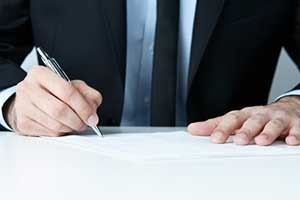Chapter 11 reorganization is most often employed by corporations and partnerships, through Chapter 11 may also provide a solution for individuals with debts or assets too large for a typical consumer bankruptcy case.
 Chapter 11 differs from other types of bankruptcy in several ways. One of the most significant is that not all Chapter 11 bankruptcies are voluntary. Although the debtor may file for Chapter 11 bankruptcy, it is also possible for creditors to force the debtor into bankruptcy under certain circumstances.
Chapter 11 differs from other types of bankruptcy in several ways. One of the most significant is that not all Chapter 11 bankruptcies are voluntary. Although the debtor may file for Chapter 11 bankruptcy, it is also possible for creditors to force the debtor into bankruptcy under certain circumstances.
As in other types of bankruptcy cases, an automatic stay typically takes effect upon filing, temporarily prohibiting creditors from pursuing collection action. The stay is intended to provide the debtor with an opportunity to consider options, negotiate and plan.
Commencing a Chapter 11 Case
A Chapter 11 case begins with a petition, whether that petition is voluntary (filed by the debtor) or involuntary (filed by creditors). The debtor is also required to file schedules of:
- Assets & Liabilities
- Income & Expenditures
- Executory Contracts and Unexpired Leases
In addition, the debtor must file a statement of financial affairs. If the debtor is an individual or a couple, there are additional requirements, including credit counseling in advance of filing.
Debtor in Possession
The debtor in a Chapter 11 case is designated “debtor in possession,” meaning that the debtor retains possession and control of assets until the Chapter 11 plan is confirmed, the case is converted or dismissed, or a trustee is appointed. In most cases, a trustee will not be appointed, and the debtor will continue to operate the company. While this allows the debtor more control than a case involving a trustee, it also creates additional record keeping burdens and fiduciary duties.
Chapter 11 Plan
 As in a Chapter 13 case, the debtor must file a reorganization plan. In a Chapter 11 case, the plan must be accompanied by a disclosure statement, which is intended to provide creditors with adequate information to allow them to make informed decisions with regard to the plan. The plan describes how each classification of creditor will be treated, and creditors whose interests are impaired vote on whether or not to accept the plan. Because creditors generally take a more active role in a Chapter 11 case, plan confirmation may be more complicated and take longer to accomplish than in a Chapter 13 case.
As in a Chapter 13 case, the debtor must file a reorganization plan. In a Chapter 11 case, the plan must be accompanied by a disclosure statement, which is intended to provide creditors with adequate information to allow them to make informed decisions with regard to the plan. The plan describes how each classification of creditor will be treated, and creditors whose interests are impaired vote on whether or not to accept the plan. Because creditors generally take a more active role in a Chapter 11 case, plan confirmation may be more complicated and take longer to accomplish than in a Chapter 13 case.
Role of the Creditor’s Committee in Chapter 11 Bankruptcy
The U.S. Trustee appoints the creditor’s committee in a Chapter 11 case. Usually, the committee will be made up of the debtor’s seven largest unsecured creditors. The creditor’s committee may play a very significant role in the case, from participating in development of the plan to consulting with the debtor in possession on various aspects of case administration and investigating management of ongoing business.
The creditor’s committee, with leave of the court, may actually employ an attorney and/or other professionals such as accountants or investigators to assist in the fulfillment of the committee’s responsibilities. When outside professionals are hired to assist the creditor’s committee, the fees associated with those services are paid by the estate, not the creditors themselves.
The Bottom Line on Chapter 11
Chapter 11 bankruptcy can be a powerful tool. Unlike the most common types of bankruptcy, which are focused merely on clearing debt, the goal of Chapter 11 is to put a business back on a profitable footing. That means the plan isn’t just about cleaning up debt, and the considerations for both the debtor and the creditors are much more complex. Finding solutions that protect the debtor’s interests and keep the business running while still protecting the creditors can be a challenge. An attorney with experience in formulating Chapter 11 plans can ease the process and improve the chance of success, for either the debtor or the creditor’s committee members.
Contact KPPB LAW For More Information
Chapter 11 bankruptcy is complicated and requires knowledge not only of the bankruptcy process, but also business and accounting issues. Many attorneys, even bankruptcy attorneys, are unwilling to handle Chapter 11 cases because they realize that they lack the level of knowledge necessary to handle a case effectively. Our bankruptcy attorneys have the knowledge and experience necessary to guide you through a Chapter 11 bankruptcy. Contact KPPB LAW today by sending us a message online or by giving us a call today to discuss the options available during this process.
